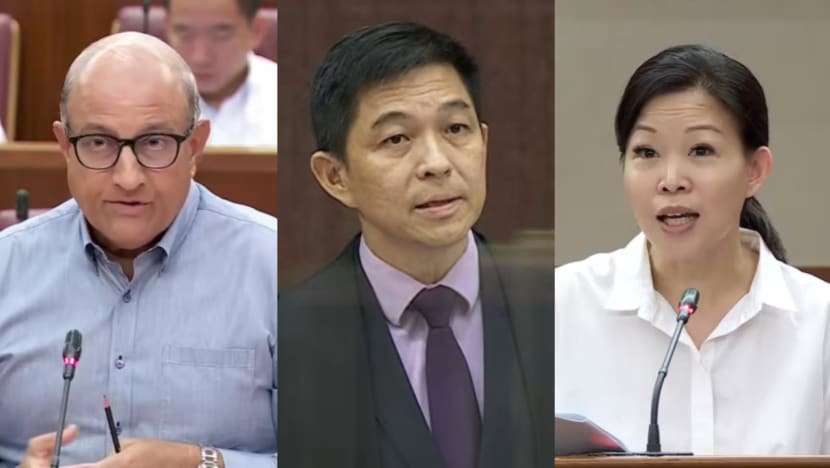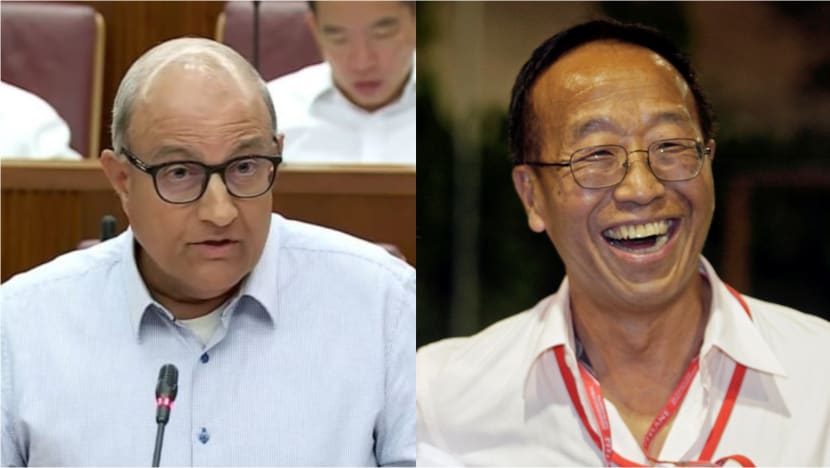Commentary: A horrible July for PAP but party leaders need to seize the moment to put things right
The issues go to the heart of Singapore politics which is about character and integrity, says former veteran newspaper editor Han Fook Kwang.

Composite photo of Transport Minister S Iswaran, former Speaker of Parliament Tan Chuan-Jin and former MP Cheng Li Hui. (Photo: CNA)
SINGAPORE: Politics in Singapore is unexciting? After July 2023, the answer will no longer be a big yawn.
More importantly, many other things changed in ways that affect the essence of political life here.
It may never be the same again.
I am getting ahead of myself so it is best to take each of the three issues in turn.
The Ridout Road saga involving ministers K Shanmugam and Vivian Balakrishnan renting government-owned bungalows was debated in Parliament on Jul 3.
The government laid down the facts of the case to try to explain why there was nothing untoward in the leases, that there was no conflict of interest despite Mr Shanmugam helming the ministry in charge of the agency overseeing the property, and that proper due process had been adhered to.
The Corrupt Practices Investigation Bureau (CPIB) found no evidence of corruption and an internal review by Senior Minister Teo Chee Hean concluded that all was in order.
Case closed?
That would be to miss the crux of the matter.
IT IS ABOUT VALUES
I believe the widespread public disquiet wasn’t mainly about actual or potential conflict of interest or corruption or due process though they are important issues and needed to be investigated. The reason why so many people were agitated when the news first broke out had to do with something more emotional and deep-seated.
It is about how they hold political leaders to account in their personal conduct, which has to do with values and ethos.
This is a very Singaporean idea but one which the ruling party cultivated from the very beginning, the belief that the country has done well because it has good leaders, not only the ablest and most committed, but of unimpeachable character and integrity, and not given to excesses and showmanship.
It is so ingrained it is in black and white in the code of conduct for ministers which has been enforced since 1954:
“The position of a Government Minister is one of trust. It is vital that Ministers do not by their conduct undermine public confidence in themselves or bring discredit to the Government. Therefore, all Ministers are expected to act at all times according to the highest standards of probity, accountability, honesty, integrity and diligence in the exercise of their public duties.”
People’s Action Party (PAP) ministers have consistently argued that without men and women with these qualities at the top, Singapore would perish.
In no other country are political leaders held in such regard - whiter than white, and akin to a priesthood, as former Deputy Prime Minister Goh Keng Swee put it.
Such an extraordinary notion of leadership defined the party and its relationship with the people.
The idea persists till today, which is why PAP leaders can sometimes appear high-minded when they lecture others, including the opposition, on the importance of maintaining high standards of character and integrity.
You have to be very white to continue adopting this political stance.
Hence ministers avoid driving flashy cars and are sensitive to being photographed (including with their spouses) wearing expensive watches and jewellery.
Which is why the thought of such a leader living in a black and white bungalow of mind-boggling size that the average Singaporean cannot possibly imagine is jarring to many people.
There is an emotional disconnect that isn’t easy to bridge with facts and figures, which is what the government sought to do in the six-hour debate in parliament.
It may well be that times have changed and Singaporeans should not expect their ministers to live as frugally as the earlier generation and be more accepting of their wealthy lifestyle including when it is openly displayed.
I think it is inevitable that this change will take place, but the PAP has to be careful that when it does, it will not overturn the party’s carefully nurtured idea of what makes for a good political leader.
If it does, it will change the party and how it relates to the people in a fundamental way, and I don’t think the party is ready for this.
HOW CLOSE IS TOO CLOSE?
The case against Mr S Iswaran isn’t fully known yet and, to be fair to him, one should not speculate over his guilt or otherwise.
But there is one issue worth raising that goes beyond this particular investigation, and it is about how close ministers should get in their personal lives with wealthy individuals.
Billionaire Ong Beng Seng and Mr Iswaran worked to bring the annual F1 race to Singapore, one a colourful entrepreneur known for his deal-making, the other the minister overseeing the project for Singapore.
Both are now being investigated by the CPIB. Did they get too close for comfort?
If corruption was involved, it is a straightforward matter of applying the law and looking at the evidence.
But there is a greyer area to do with the ministerial code of conduct on influence peddling by businessmen.
This is how the code puts it:
“Ministers are more than ordinarily open to undue pressures from persons who would like the Minister to use his position to gain some undue advantage for themselves. A Minister must reject any such attempts, especially where accompanied by gifts of any kind (including any intangible benefits, hospitality, tickets, concessions or free or undervalued services).”
This problem is bound to grow as more wealthy people are attracted to Singapore and the government expands its role in the economy, either directly or through government-linked companies (GLCs).
It can also be exacerbated by the common practice of appointing successful businessmen to head grassroots and community organisations, partly because of their ability to raise funds through their business connections.
The growing ties between the public and private sector has its benefits, helping public servants understand better how the business world works.
But how close is too close?
It may be time to update the code with greater clarity on what is acceptable or not and how to better protect ministers when they are expected to work closely with their private sector counterparts.



IS AN AFFAIR AN ABSOLUTE NO-NO?
Finally, the saga involving former Speaker of Parliament Tan Chuan-Jin’s affair with his fellow Member of Parliament Cheng Li Hui and their subsequent resignations, has raised many questions including why the affair wasn’t disclosed earlier when Prime Minister Lee Hsien Loong had known about it since 2020 and whether it was right for Mr Tan to carry on as Speaker until his resignation a few days ago.
But the core issue is again about propriety and personal conduct.
Is an extramarital affair an absolute no-no?
Or does it depend on whether the affair affects the person’s ability to carry out his official duties, and if the person and the other party are in what might be considered a work place relationship. In this case, in parliament - between the Speaker and an MP.
Or is it a private matter that no one should have any business interfering with?
Have societal norms changed so much that what was once black and white is now a lot of grey?
There was one comment by Mr Lee that appeared to indicate a shift: “If the behaviour is not outrageous or scandalous to begin with and the MP heeds the advice, corrects it, makes amends, puts a stop to what should not happen, then we will not punish them severely and automatically kick them out. Because what you do and what consequences the person should face also depends on the positions they hold and other factors, the circumstances, the family situations, how inappropriate or egregious the behaviour was.”
You will find mixed views on the matter among Singaporeans, so it ultimately comes down to the party’s own position on - you guessed it - the personal conduct of party leaders and ministers.
To be hit three times in a month over issues that are central to the party’s identity is highly unusual.
Perhaps it is an early warning sign that the matter needs to be addressed urgently and comprehensively, and, if necessary, to restate and refresh its position, preferably in black and white.
Grey is a lot harder to put down in a code of conduct.
The issues ultimately go to the heart of Singapore politics, which the PAP has always argued to be more about character and integrity than laws and institutions.
Lee Kuan Yew famously once said that a country can be saved despite having bad institutions if there are good people running them, but will be ruined even with good institutions if bad people are in charge.
The past month has brought these issues to the fore like never before.
Party leaders should seize the moment to discuss them thoroughly so Singaporeans are clearer what has changed and what not.
Han Fook Kwang was a veteran newspaper editor and is Senior Fellow at S Rajaratnam School of International Studies, Nanyang Technological University.
















